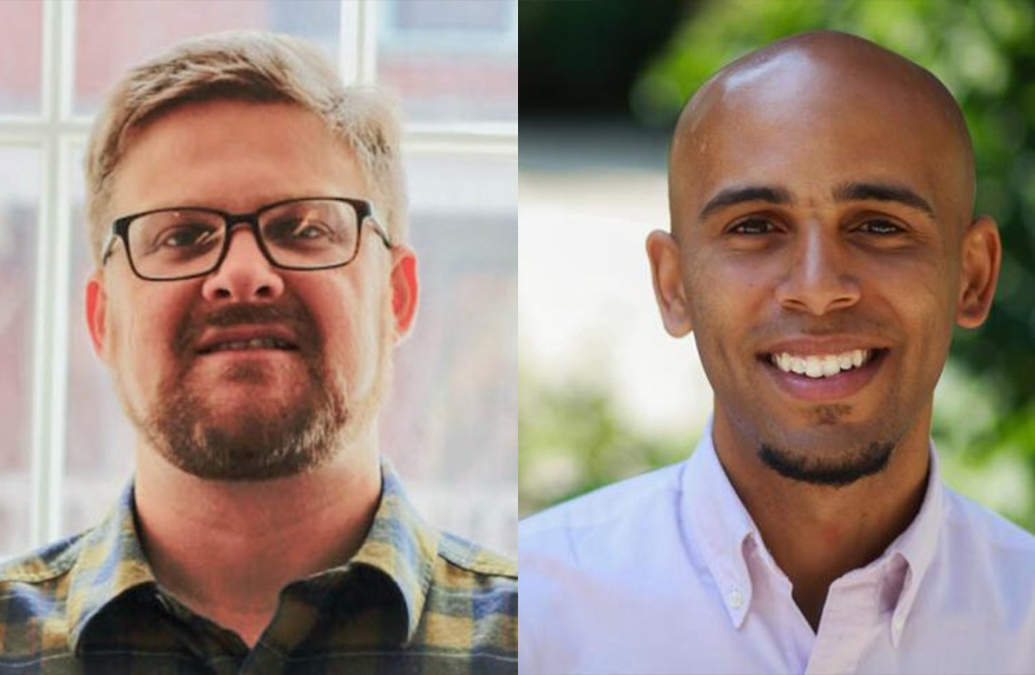Cultural Preservation and Sustainability Partnerships: 2024 Howard R. Swearer Engaged Faculty Award Recipients

Scott AnderBois, Associate Professor of Linguistics (L) and Myles Lennon, Dean’s Assistant Professor of Anthropology and Environment and Society (R)
From an extremely strong pool of nominees, a committee representing student, staff, faculty and community partner perspectives selected Scott AnderBois and Myles Lennon as the 2024 recipients of the Howard R. Swearer Engaged Faculty Awards. Lauded by community and faculty colleagues and students in nomination letters, both have developed deep collaborations with community members as well as organizations, centering those partnerships – and respect for community assets and goals – in their scholarly work. Both conduct research and engage students in ways that generate knowledge and contribute to cultural preservation and sustainability.
Since 2015, Scott AnderBois, Associate Professor of Linguistics, has developed and sustained the A'ingae Language Documentation Project (ALDP) in collaboration with Cofán community members. Sparked by a conversation with Hugo Lucitante, who was then an undergraduate student at Brown and now is Executive Director of the Instituto Para La Conservación y Capacitación Ambiental (ICCA), the project has engaged approximately 10% of the Cofán Nation – including one now believed to be the first Cofán person to receive a Master’s degree – as well as students at Brown. This work has produced numerous academic publications and theoretical insights, as well as an audio/video database, digital animations, a dictionary, co-taught courses and related training workshops that build capacity for continued research and teaching.
According to two faculty nominators, Ruth Colwill from the Department of Cognitive, Linguistic and Psychological Sciences and Pauline Jacobson from the Linguistics Program, AnderBois “is at the forefront of the new generation of linguists…. He takes quite seriously the idea that the documentation and its benefits to the community is of utmost importance and that at the same time the best analysis of a language will ultimately be done by its speakers.” The partnership with ICCA recently led to the purchase of land for a new research station and field school lab. As Lucitante observes, “in Amazonian Ecuador, the few research stations that do exist within Indigenous Nations exclude Indigenous autonomy and decision-making in research objectives, methods, long-term goals and long-term faculty operations,” so the collaboration between Brown and ICCA represents “a significant step towards progress” – in part because AnderBois “has always respected me and my people as equal partners.”
Over the years, many undergraduate and graduate students at Brown have learned from and contributed to community-based language preservation, both in Ecuador and through remote engagement, a necessary adaptation, especially during the Covid pandemic. Some have published with AnderBois, Lucitante or other collaborators, and several linguistics and computer science double concentrators developed an accessible web interface for ALDP. As Director of the newly independent Linguistics program, AnderBois is now thinking about how to integrate community engagement within it. In the meantime, seven current and former students wrote with appreciation of his scholarly example and “empowering mentorship” – and six Cofán community members added their voices to the letter of support, emphasizing the importance and impact of this ongoing collaboration.
Myles Lennon, Dean’s Assistant Professor of Anthropology and Environment and Society, centers engaged ethnographic research in his scholarship on “solar energy, land stewardship and climate resilience in Black communities.” For instance, he is working with a coalition of Black farmer organizations to pilot a holistic approach to supporting young Black farmers, and he is partnering with a collective of Black and Indigenous land stewards to identify best practices for negotiating the ethical and political tensions of working for decolonial climate resiliency. Embedded in specific places and relationships, he disseminates lessons from his research not only in peer-reviewed articles and a forthcoming book, Subjects of the Sun: Sensing Solar in the Shadows of Racial Capitalism; his scholarly products also include public reports and workshops with organizations working to support Black farmers and climate justice policy. As Paja Faudree, Interim Chair of Anthropology, writes in a letter of support, “the ambition and promise of his work stems from his skills as an ethnographer and critical thinker.” Lennon identifies best practices, analyzes the conceptual and systemic contexts affecting collaborators, captures their transformative frameworks (e.g., in the widely cited article “Decolonizing Energy”) and fosters other connections to advance their goals and a shared research agenda.
One of Lennon’s major partners is Shelterwood Collective, a community of Indigenous, Black and Queer land stewards who live and work on a 900-acre property in Northern California. As part of an ongoing collaborative research project, Lennon developed a paid summer fellowship for undergraduates from Brown, who have participated both in ethnographic research and in land stewardship and forestry projects - an experience they have found deeply meaningful. He also mentors students interested in connecting their academic studies with community issues and partners as the Department of Anthropology’s Director of Undergraduate Student Engagement.
In addition to intentional work with community-based coalitions and networks, Lennon contributes to change efforts within the university. According to Kim Cobb, Lawrence and Barbara Margolis Director of the Institute at Brown for the Environment and Society (IBES), Lennon has been playing “an increasingly important role” in developing the “Equitable Climate Futures” initiative and advancing IBES’ diversity, equity and inclusion goals: “he has much to teach us all about equitable, just approaches to engaged research and how we can best support those within academia.”
Note: Prior to 2023-24, the Howard R. Swearer Engaged Faculty Awards included separate awards for engaged research and engaged teaching. Beginning in 2023-24, the Vice President for Community Engagement and the Swearer Center will present two annual awards recognizing faculty at Brown whose scholarship (research and/or teaching, as appropriate to their position) engages community partners in reciprocal relationships to co-produce knowledge, high-impact learning experiences and tangible public benefit. One of the two awards is reserved for an early career faculty member.
